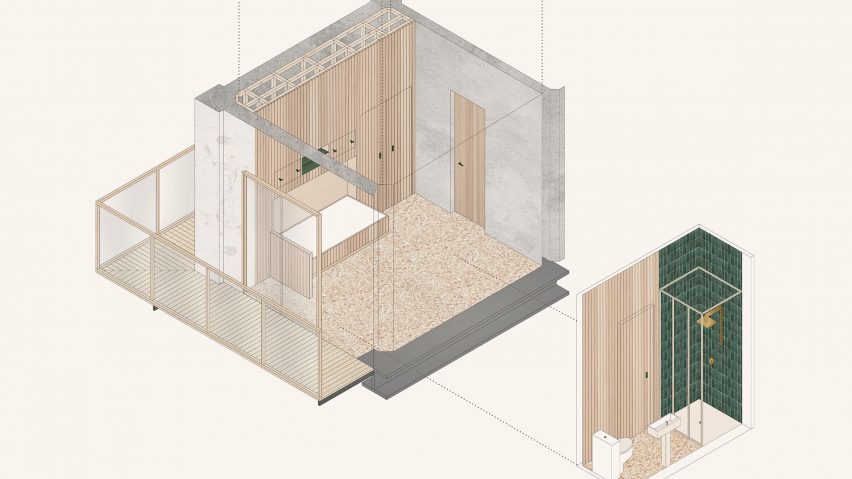
Kingston School of Art highlights 10 student design projects
Dezeen School Shows: a fashion collection that celebrates the designer's Ukrainian roots and an allotment scheme at London's Docklands are included in Dezeen's latest school show by students at Kingston School of Art.
Also included is a chair that looks to respond to people's changing seating habits, allowing its users to be seated in multiple directions.
Kingston School of Art
School: School of Design
Course: Graphic Design, Interior Design, Product & Furniture Design and Fashion
School statement:
"Kingston School of Art's Graphic Design course encourages students to be innovative, invent and inspire change. In addition to learning core design and research skills, students work on live projects throughout the course.
"Design fields include photography, film and animation, typography, interaction, service design, user experience, social design, digital, book and editorial design. At the end of the course students are equipped with a combination of creative skills, cognitive processes and methodologies helping to shape the future for business, culture and communities.
"The Interior Design course allows students create dynamic and thought-provoking interior environments, developing practical skills, creating imaginative spaces that meet the needs and enrich the experience of modern life. Students get to work in purpose-built design studios and have access to a dedicated art and design library, benefitting from links with design studios, cultural institutions and community groups.
"The Product and Furniture Design course provides the skills, knowledge and practical experience for a career in professional design. Design work covers domestic and commercial furniture, housewares and ceramics, and industrial and technology products. The course collaborates and engages with industry at all levels from live industry briefs to masterclasses and talks by industry professionals.
"The Fashion course focuses on evolution and radical change in design, exploring how design is influenced by cultural, social, critical and historical studies. Students will develop their own signature style, experimenting across sketch work, 2D to 3D, knitwear and digital print in the workshops and dedicated fashion design studios. Access is also given to the working dress archive which includes pieces from 1750 to the present day."
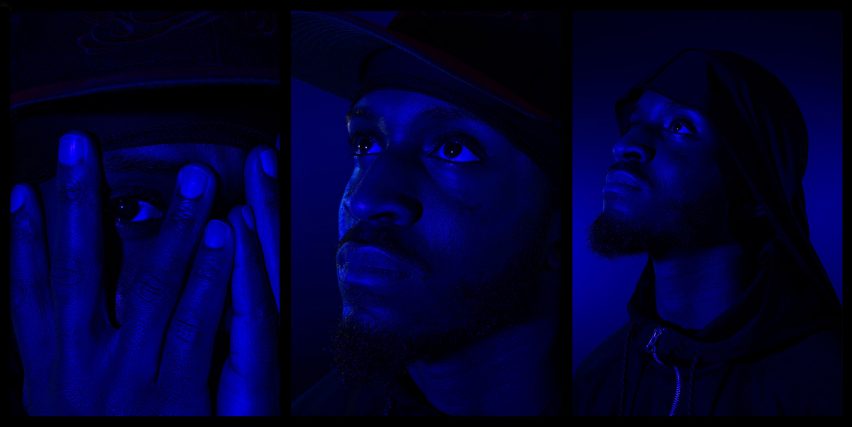
Boys in Blue by William Sousa
"This project aims to challenge the notions of masculinity through an intimate portrait series. Black men can freely remove the 'cool-posed' performance, exposing their vulnerabilities as they renegotiate their masculine identity."
Student: William Sousa
Course: BA(Hons) Graphic Design
Tutors: Paul Jenkins and Andrew Moran
Email: k1901480[at]kingston.ac.uk
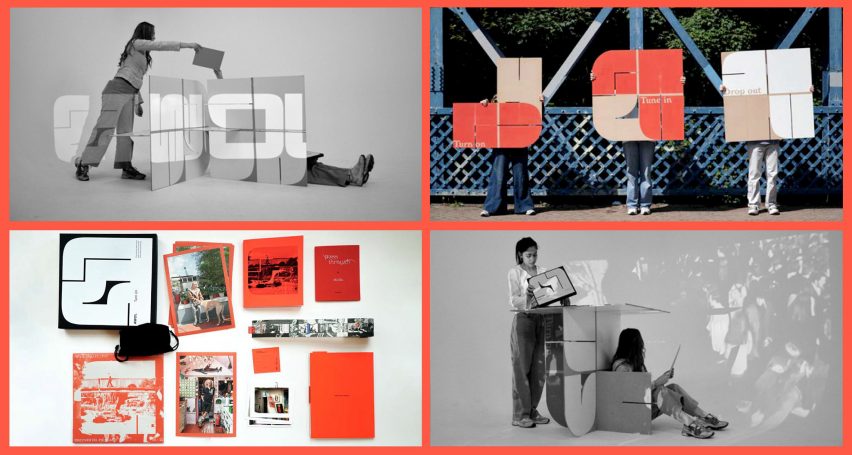
AWOL by Hannah Weatherhall, Lilia De Abreu and Phoebe Leadbeater
"The AWOL collective lives as a portable, interchangeable exhibition space, paired with an issue box featuring a recorded podcast, portraits, postcards, a 'pass through', instruction manual, film reel and exhibition catalogue.
"It explores alternative ways of living, with a focus on Eel Pie Island. To be displayed at the bottom of Eel Pie Island bridge and then further displayed at the Eel Pie Island Museum."
Student: Hannah Weatherhall, Lilia De Abreu, Phoebe Leadbeater
Course: BA (Hons) Graphic Design
Tutors: Zoe Bather and Linda Byrne
Emails: k2022464[at]kingston.ac.uk, k1913194[at]kingston.ac.uk and k1907707[at]kingston.ac.uk
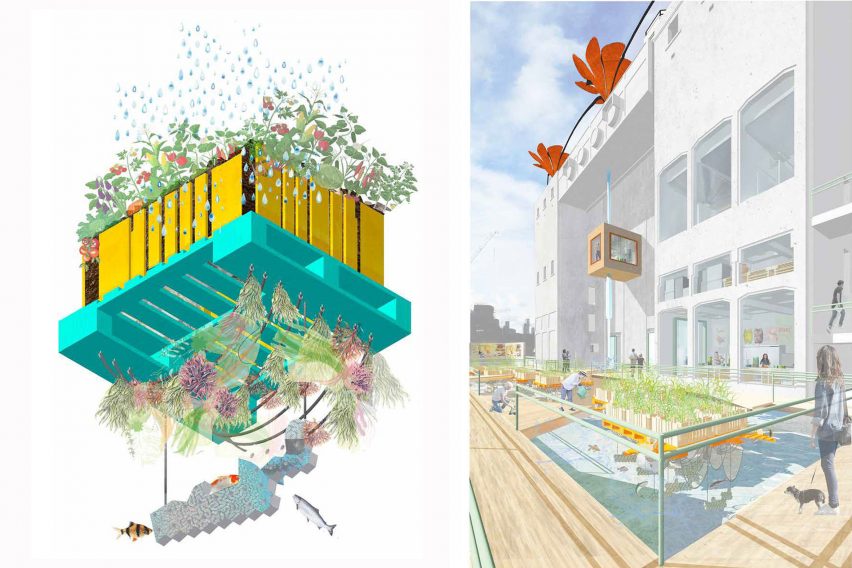
Pickle Palace by Honi Briggs
"Pickle Palace pays homage to Dockland’s rich history, changing the narrative from grain import and export to floating allotments, fermentation chambers and cookery classes.
"In collaboration with the charity, Migrateful, the scheme aims to celebrate chefs and their traditional cuisines, through the belief a meal has the capacity to bring us together, tell stories, share, discuss and form connections through placing fermentation at the forefront as a symbol of cultural exchange and education.
"In reaction to public anger at the closure of Newham City Farm and the high demand for community allotments, the scheme provides floating gardens, inspired by the traditional Mesoamerican agricultural technique; Chinampa. The allotments enable a clear connection between nature and architecture whilst practically supplying vegetation for the fermentation facilities.
"The scheme intends to inform the public about sustainable food sourcing, whilst enhancing the docks ecology and encouraging people to simply gather and eat with one another."
Student: Honi Briggs
Course: BA (Hons) Interior Design
Tutors: Sigrun Sverrisdottir, Jack Headford and Greg Epps
Email: honibriggsdesign[at]gmail.com
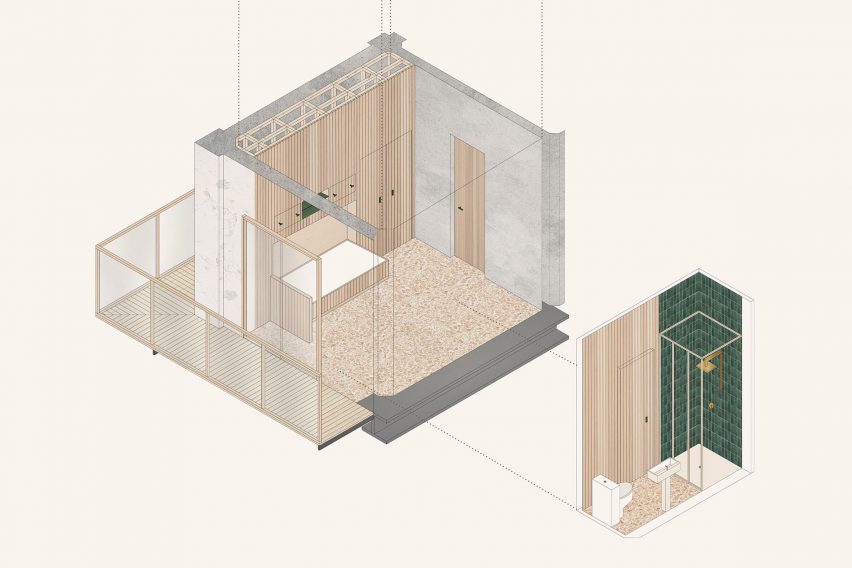
Beyond the Barges by Amanda Torchia
"This is a proposal in response to Newham's homeless crisis; providing accommodation, kitchen/café, counselling spaces and a workshop where disused barges from the dock are renovated in order to create affordable housing.
"These boats can then be sold on and the money received can be put back into funding the programme. The workshop re-purposes a Hopkins prefab structure to provide residents a stable income and transferable skills.
"The shelters' ground and first floor are open to the public in order for residents to make a connection with their local community and be allowed to have a safe space to socialise with the public."
Student: Amanda Torchia
Course: BA (Hons) Interior Design
Tutors: Sigrun Sverrisdottir, Jack Headford and Gregg Epps
Email: amandatorchiadesign[at]gmail.com
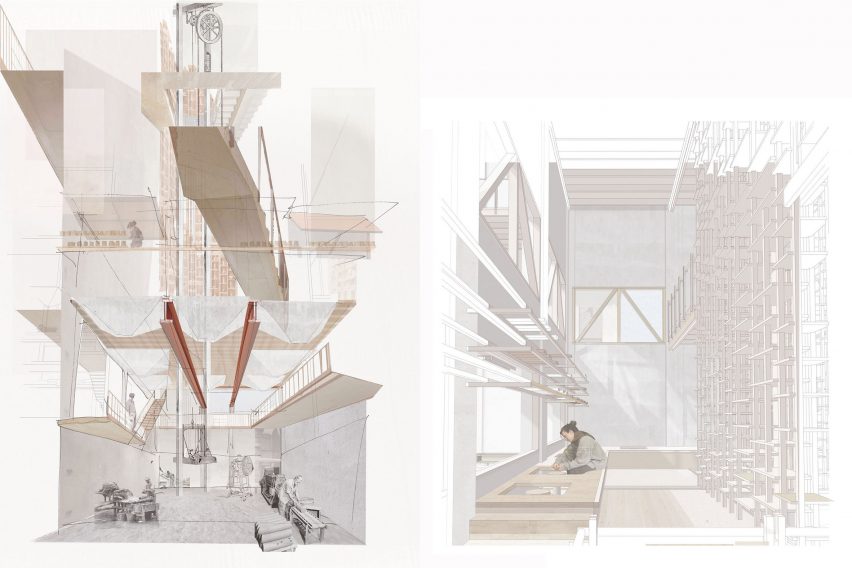
Silo D by Amy Brown
"Occupying a disused grain silo in London's Docklands, this proposal utilises the derelict, industrial fabric of the past and celebrates the hands-on spirit of the site's history. Reinvigorating the former factory as a means to deconstruct local discarded ceramic objects and surrounding building waste such as bricks, tiles and concrete to be used as new material for the workshops.
"Using rubble from the area to construct and shape the future of the area. The workshops and surrounding market spaces act as a way of developing local economies, forming a creative ecology where community artists and creatives can become economic engines their neighbourhoods and a space that has been devalued. The deconstruction of waste in the reconstruction of community."
Student: Amy Brown
Course: BA (Hons) Interior Design
Tutors: Sigrun Sverrisdottir, Jack Headford and Gregg Epps
Email: amybrown2319[at]googlemail.com
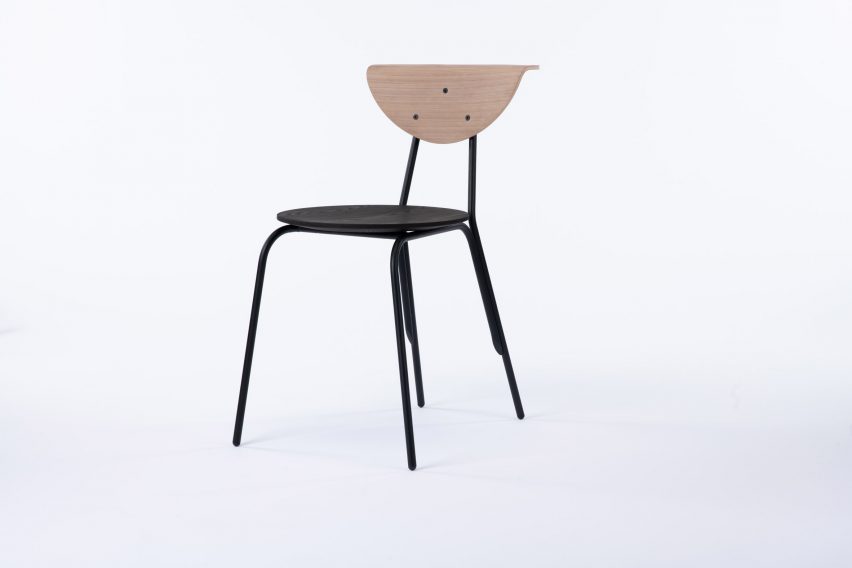
Turnaround Chair by Rory Mullins
"Turnaround Chair is a new typology of contract furniture which reacts to users' real-world seating habits. A cantilevered backrest/armrest accommodates the user sitting in multiple directions.
"The circular Omni-directional seat base further offers users complete freedom of movement. A production chair for cafes, educational and communal spaces."
Student: Rory Mullins
Course: BA (Hons) Product & Furniture Design
Tutors: Phil Davies, Carl Cerkin, Jon Harrison and Andy Dray
Email: rory[at]mullinscycles.co.uk
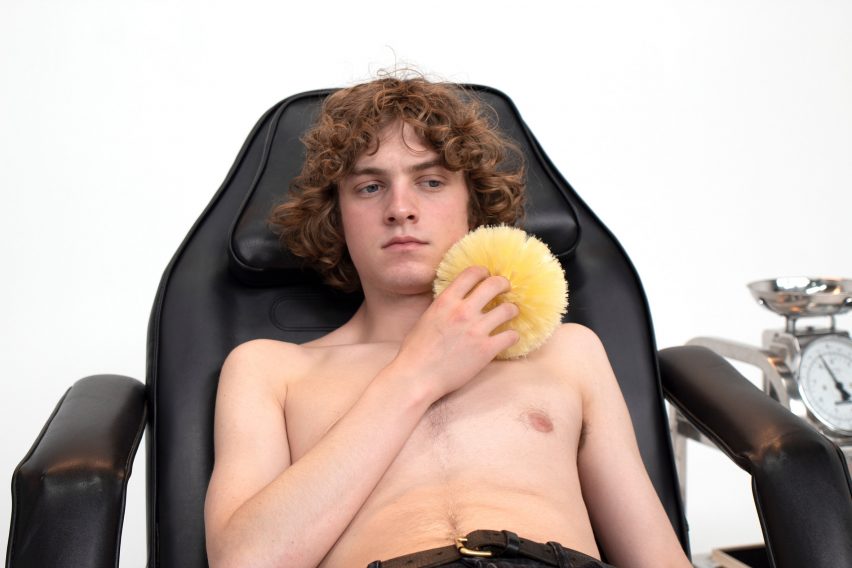
The Touch Clinic by James Woods
"As we move towards the commonly imagined future of a technology-driven society, and creation of virtual worlds what would the ramification of this reality be? Presented as a film it depicts a spectacular design fiction of a civilisation starved of touch.
"It is set in a clinic where specially calibrated tools are prescribed and taken home by the patient to provide the valuable sensory stimulation the patient needs. These quality crafted sensory tools include a natural fibre brush ball, silicone brush ball, prickly tools, a body vacuum and pressure tools.
"The Touch Clinic probes the question of how changing social behaviour due to technological advancements might affect us in the future. Provoking consideration whether changing behaviour in the short term can avoid the drastic need for Touch Clinics."
Student: James Woods
Course: BA (Hons) Product & Furniture Design
Tutors: Phil Davies, Carl Cerkin, Jon Harrison and Andy Dray
Email: jameswoodsdesign[at]gmail.com
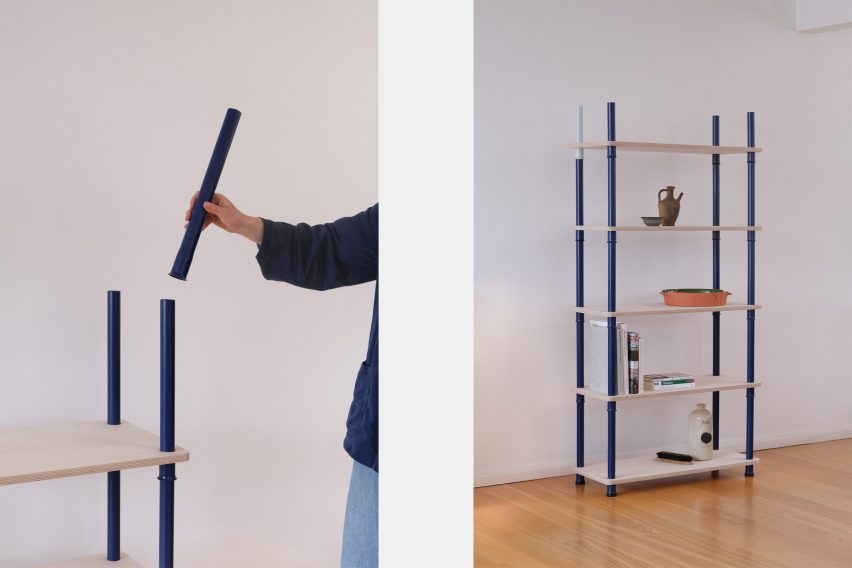
Swaged Shelving Unit by Eleanor Murphy
"Swaged is a modular shelving unit with minimal components and no fixings, that has been inspired by, and celebrates the traditional forging process of swaging.
"The tubular sections have been formed to create a junction that allows unlimited height shelves and free-standing room dividers to be easily assembled and disassembled by hand, without the need for tools. It can therefore adapt and be re-configured to suit each individual user’s needs."
Student: Eleanor Murphy
Course: BA (Hons) Product & Furniture Design
Tutors: Phil Davies, Carl Cerkin, Jon Harrison and Andy Dray
Email: eleanor.b.murphy[at]outlook.com
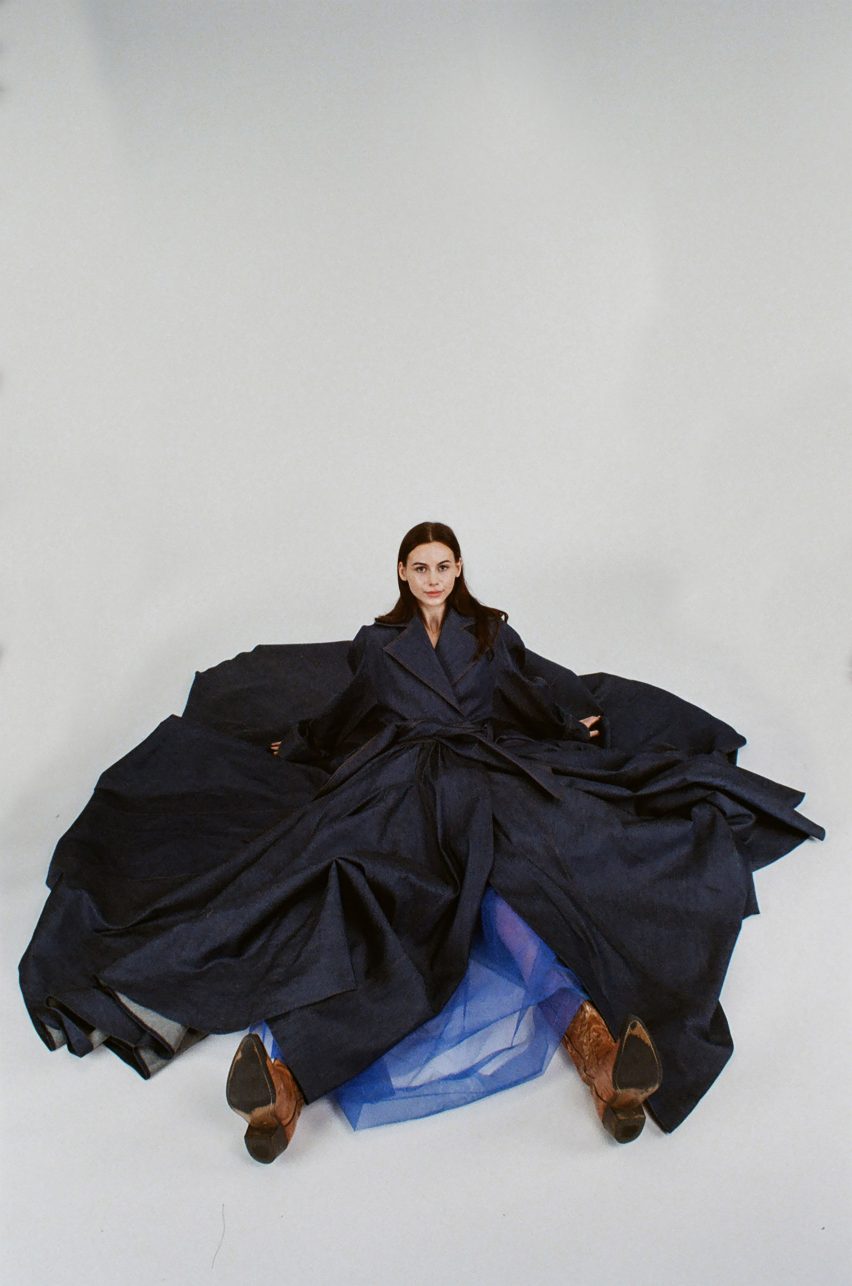
Where's my teenage dream? by Lydia James
"Where's my teenage dream? explores the coming-of-age period, the ever-changing landscape of being a teenager, and the traumas of growing up. The project draws upon the personal experiences that I and my sisters had, female musicians and the films I watched as a teenager.
"My collection mixes mohair knitwear with denim predominantly and is made up of eight looks. The silhouette mimics that of being a teenager, overwhelming, oversized, playful and voluminous. This collection serves as a love letter to my sisters and my younger self."
Student: Lydia James
Course: BA (Hons) Fashion
Tutors: Tony Bednall, David Frizzel and Wendy Baker
Email: K1726213[at]kingston.ac.uk
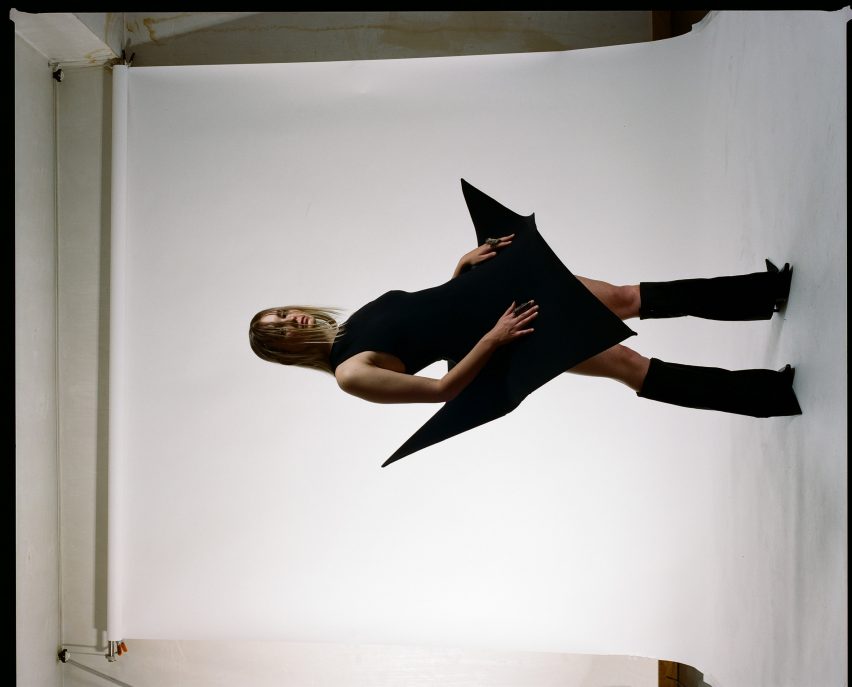
Complex Divorce by Zhanna Moskalyova
"The collection Complex Divorce references my split heritage: reflecting the separation of Ukraine from Russia. The initial inspiration of my work focused on the evolutions of Ukraine's identity after the collapse of the Soviet Union.
"In the last couple of months, with the ongoing war, developments of my collection gained a deeper more personal meaning. Identifying more with my Ukrainian roots as inspiration and celebration.
"The research behind the collection forms the basis of a built narrative surrounding my family history. To fill in the gaps of a Soviet past and a split present.
"I have been heavily influenced by photographers who capture the abandonment of ex-soviet countries, overcast with a western influence."
Student: Zhanna Moskalyova
Course: BA (Hons) Fashion
Tutors: Tony Bednall, David Frizzel and Wendy Baker
Email: K1089892[at]kingston.ac.uk
Partnership content
This school show is a partnership between Dezeen and Kingston University. Find out more about Dezeen partnership content here.